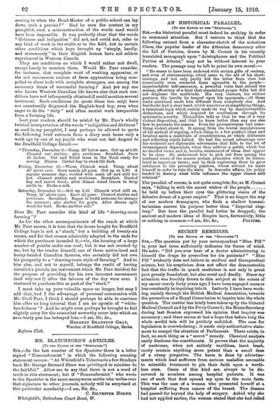AN HISTORICAL PARALLEL
[To TRY EDITOR Or THE "SPECTATOR:9 SIR,—An historical parallel must indeed be striking in order to command attention. But I venture to think that the following extract from a character-sketch of the notorious Cleon, the popular leader of the Athenian democracy after the fall of Pericles, drawn by M. Croiset in his recently translated monograph upon "Aristophanes and the Political Parties at Athens," may not be without interest to your
readers. The passage may be left to point its own moral :—
" He seems to have been endowed with certain gifts of oratory, and even of statesmanship, which came to the aid of his short- comings, and not only partly hid the latter from view but occasionally even rendered them agreeable to the people— imperturbable self-assurance, a powerful voice that stirred the masses, effrontery of a kind that scandalized proper folks but did not displease the multitude. His very clamors, his violent gestures, the insults he heaped upon his opponents,—all these traits combined made him different from everybody else. And besides he had a clear head, which was clever at simplifying things, a trenchant logic which readily made its way by incontrovertible deductions, and which imposed its conclusions through its systematic severity. Thucydides tells us that he was of a very violent disposition, and that he knew better than any one else how to persuade the masses. Even his persuasiveness had some- thi g violent about it. It sprang from the brutal impulsiveness of his method of arguing, which clung to a few positive ideas and brushed aside a multitude of considerations, at which deliberate and reflecting minds halted. He had the actual advantage over his moderate and diplomatic adversaries that falls to the lot of intransigeant dogmatists, when they address a public which has no decided views, and is, besides, enamoured of ideas that appear to be clear. Ho understood how to pick out from among the confused views of the masses certain principles which he formu- lated in imperious terms ; and by thus expressing them he gave substance to the prevailing passions, whose servant he made himself in order to rule the state. In domestic affairs, his policy tended to destroy what little influence the upper classes still retained."
The parallel, of course, is not quite complete, for, as M. Croiset says, " falling in with the secret wishes of the people he held up before their eyes the glittering vision of the delusive dream of a great empire." That is no longer the way
of our modern demagogue, who finds a shallow humani- tarianism answer his purpose better than " Imperial clap- trap." But here the parallel had better be dropped; the ancient and modern ideas of Empire have, fortunately, little or nothing in common.—I am, Sir, &c., PoLiTzs,






































 Previous page
Previous page